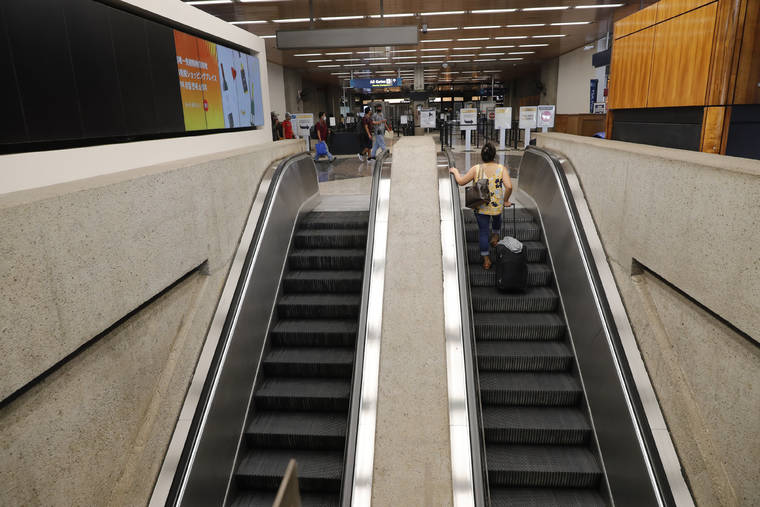Hawaii’s visitor industry braces for another pre-arrivals testing delay

JAMM AQUINO / JAQUINO@STARADVERTISER.COM, JULY 31
Gov. David Ige said Thursday that he might further delay the start of a pre-arrivals testing program, but he didn’t specify a new date.
Some signs of Hawaii’s fledgling tourism recovery are flying away as the state’s visitor industry braces for another delay in the start of a pre-arrivals testing program.
A pre-arrivals testing program would allow travelers who have taken an approved COVID-19 Opens in a new tab test within 72 hours of traveling to Hawaii to bypass a mandatory 14-day self-quarantine for out-of-state passengers. Last month, Gov. David Ige postponed it from Aug. 1 to at least Sept. 1.
Ige said Thursday that he might delay the start of a pre-arrivals testing program again, but stopped short of announcing a new date. The possible pause comes as new COVID-19 cases in Hawaii hit a single-day record of 355, bringing the count of active infections in Hawaii to 2,556. Altogether, since the pandemic started there have been 4,312 cases. Two more deaths Thursday brought the total death count since the pandemic to 40.
“With the case count increasing the way it has, it would be very difficult to implement and start the pre-travel testing program on Sept. 1,” Ige said during a Thursday press briefing.“But we have not made that decision. We do want to see another few days of data to see what the impact of the increased restrictions have been on Oahu.”
Heightened uncertainty already has prompted some members of Hawaii’s visitor industry to delay their own reopening plans, with the expectation that Hawaii’s tourism lockdown might extend to at least October and maybe longer.
Rumors of a new delay started circulating about a week ago when the state reinstated various restrictions aimed at improving social distancing. On Tuesday, Ige also restarted a partial mandatory 14-day interisland self-quarantine for those arriving to the counties of Kauai, Hawaii island, Maui and Kalawao.
Don't miss out on what's happening!
Stay in touch with breaking news, as it happens, conveniently in your email inbox. It's FREE!
Lt. Gov. Josh Green confirmed some of the industry’s worst fears Tuesday when he said it was unlikely that a pre-arrivals testing program could start before Oct. 1 unless the COVID-19 surge was contained. Green, who was speaking at a Hawaii CCIM and Pacific Asia Travel Association Hawaii Chapter event, said a Sept. 1 tourism reopening likely would come with added complications from schools restarting and the Labor Day holiday weekend — given that large Fourth of July gatherings contributed to community spread.
Hawaiian Airlines, the state’s largest carrier, already has reduced flying within the islands by 42% for the second half of August. Effective Sept. 1, it’s also scaling back daily services between Honolulu and Sacramento to three times weekly and between Honolulu and Portland to five times weekly.
“Each day a pre-arrival testing program is delayed creates significant economic damage to our state, Hawaiian Airlines and other Hawaii companies that directly or indirectly depend on air travel and tourism to stay in business and keep workers employed,” said Hawaiian spokesman Alex Da Silva.
Last month, Hawaiian issued 60-day notices to its labor unions that it might have to furlough more than 2,000 union workers in departments across the company.
Daniel Chun, spokesman for Alaska Airlines, said the carrier currently operates just four daily flights to Honolulu and Kahului from Seattle and San Diego. With plans to add more flights Sept. 1, Alaska was in the process of bringing back around 1oo employees and several aircraft that had been parked over the past several months.
“If the pre-travel testing program is delayed once more, we will again need to reevaluate our flight schedule for September,” Chun said. “We understand and fully support the difficult decisions that need to be made to help keep our community healthy and safe, but as the dates continue to shift and plans remain uncertain, it adversely affects the livelihoods of our employees and becomes a real challenge for our operations.”
Mufi Hannemann, president and CEO of the Hawaii Lodging & Tourism Association, said some of the hotels that had planned to reopen Sept. 1 also are putting plans on hold and the delays are painful.
Meanwhile HLTA is developing a geofencing app with other tourism partners that would allow for “resort bubbles” in places like Waikoloa, Wailea and Princeville. Visitors, from source markets with low COVID-19 counts, still would have to quarantine but could roam freely within these resorts. They wouldn’t be allowed off the resorts for the 14 days. If they stray, the geofencing app would alert police.
“Kauai Mayor Derek Kawakami is interested in a resort bubble and has a team looking at how to bring this about,” Hannemann said. “We’re looking to make similar cases on other neighbor islands such as Maui and Hawaii island.”

 Holy Week & Easter in Aiea || Free Events for All at OSHi! ️️
Holy Week & Easter in Aiea || Free Events for All at OSHi! ️️

